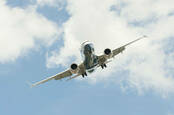This article is more than 1 year old
We don't know whether 737 Max MCAS update is coming or Boeing: Anti-stall safety fix delayed
Airlines will have to wait few more weeks to get new code as engineers need more time
Boeing yesterday warned it will take longer than expected to overhaul the anti-stall system in its 737 Max aircraft, the infamous safety mechanism that likely caused two deadly crashes.
Both the manufacturer and America's aviation watchdog, the FAA, said the deployment of a software update for the airline jets' Maneuvering Characteristics Augmentation System (MCAS), to improve the component, will be delayed as engineers continue to work on it.
MCAS is believed to have caused a pair of crashes, one in March, and the other October, killing 346 passengers and crew total, by forcing the aircraft into unrecoverable nosedives.
The combination of software and hardware is supposed to activate when the plane may stall, and tips the nose down to avoid that. Unfortunately, if bad sensor data is fed into it, the software will repeatedly try to override the pilots' controls, and force down the plane, unless the crew managed to flip the right switches to disable it. The pilots have about 40 seconds to kill the safety component before it kills them, simulations later discovered. A warning indicator that all is not well with the sensor data was an optional extra that budget airlines tended to skip.
The 8 and 9 versions of the 737 Max fleet have been pretty much grounded worldwide since mid-March as the Washington-based Boeing works to make their MCAS code safe, mainly by detecting whether its angle-of-attack sensor data is legit or faulty before making any critical decisions. Now, both the FAA and Boeing say the fleet will stay out of service at least a few weeks longer than planned.
"The FAA expects to receive Boeing’s final package of its software enhancement over the coming weeks for FAA approval. Time is needed for additional work by Boeing as the result of an ongoing review of the 737 MAX Flight Control System to ensure that Boeing has identified and appropriately addressed all pertinent issues," a spokesperson for the US aviation body told El Reg.

Ethiopian Airlines boss confirms suspect flight software was in use as Boeing 737 Max crashed
READ MORE"Upon receipt, the FAA will subject Boeing’s completed submission to a rigorous safety review. The FAA will not approve the software for installation until the agency is satisfied with the submission."
Meanwhile, the airline jet maker told us: "Boeing continues to work with the U.S. Federal Aviation Administration and other regulatory agencies worldwide on the development and certification of the MCAS software update and training program.
"We are working to demonstrate that we have identified and appropriately addressed all certification requirements and will be submitting for FAA review once completed in the coming weeks. Safety is our first priority, and we will take a thorough and methodical approach to the development and testing of the update to ensure we take the time to get it right."
While no definitive timeline was given, the statements of both Boeing and the FAA would suggest the fix would likely not be in place until some time in May, at the soonest.
Not just a software issue
While new software is welcome, it's worth reiterating that, at this stage, it appears the cause of the Lion Air and Ethiopian Airlines crashes wasn't entirely code related.
It seems a faulty angle-of-attack sensor in the aircraft's nose emitted bad readings that convinced the on-board computer that the aircraft was about to stall, causing it to push the plane's nose lower to recover the situation. MCAS is supposed to try this just a few times before giving up, but each time the pilots took back control, the system would reset its counter, meaning every time the pilots pulled up, MCAS would try again to nose down, eventually driving the aircraft into the sea or ground.
What concerns some in the aviation field is that MCAS is governed by a single sensor, rather than multiple sensors that would provide redundancy and cross checking. Having one sensor fail is not uncommon, and the result should not involve the thing flying itself into the ground, which is why Boeing has to join up its software to more sensors.
Neither Boeing nor the FAA have confirmed exactly what changes will be made to the MCAS software, though it looks certain that the code is only part of the problem.
Nevertheless the pressure is on to get the world's 737 Max fleets back in the air. American Airlines, one of Boeing's biggest customers, is having to cancel about 90 flights a day at the moment, and another big customer, Norwegian, is reportedly considering legal action against Boeing for the costs the budget airline has incurred from having its fleet grounded. ®
